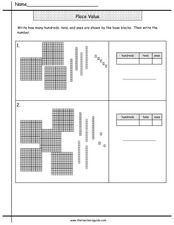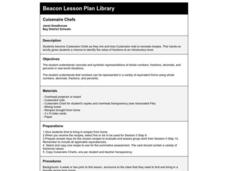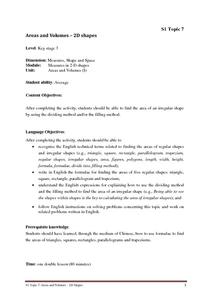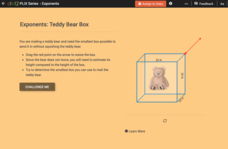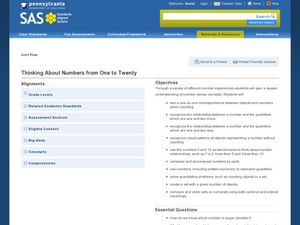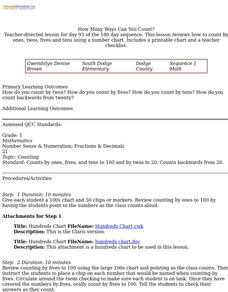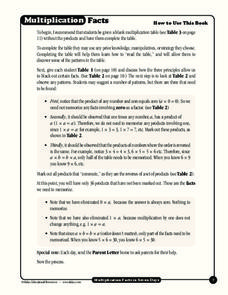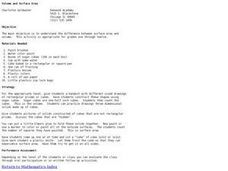Curated OER
What's Missing?
Add a challenge for your young mathematicians' adventures in double-digit addition. Instead of simply computing sums in the 9 problems, they work backwards to fill in blanks among the addends. Resource makes a terrific extension or...
Curated OER
Relating Multiplication and Division
Help the class determine missing factors in equations by creating arrays. Through modeling and practice, they come to see the inverse relationship between multiplication and division. As an assessment, individuals build their own array...
Curated OER
How Much is Saved?
Counting pence is great because some of the common coin values are two, five and ten. Learners assess each piggy bank and count the pence contained within. They count by 2s, 5s, and 10s depending on the coin in each bank. Tip: The...
Curated OER
Expanded Form (P)
Now here is a challenge that can be used toward the end of the second grade. Learners will assess 12 five-digit numbers and write each in expanded form. A great way to reinforce place value and build number sense.
Curated OER
Patterns Patterns Everywhere
Upper graders work with number patterns. In this pattern lesson, learners recognize and continue number patterns and find the rules. They do some as a class and complete an assessment.
Curated OER
Place Value Blocks
Flats, rods, and units are used to show what place value actually represents. Learners assess each image, writes the number of flats, rods, and units displayed then write the whole number each image represents. There are 5 problems to...
Curated OER
E3 Practice Assessment - Pets
In this assessment worksheet, 3rd graders complete eight pages of math assessment. Students solve problems related to money and a bar graph. Students solve word problems involving rounding and computation.
Curated OER
Money Math Carnival
Third graders explore money in a carnival format. In this money lesson, 3rd graders create a carnival of mathematics activities. Students determine the value of money in mixed amounts and explore how to create representations of money.
Curated OER
Math-Measurement
First graders examine measurement. In this measurement lesson, 1st graders practice using nonstandard units to help in measuring objects. Students listen to How Big is a Foot and complete an activity using unifix cubes to measure line...
Curated OER
Motherhood Math: Mothers in the Workforce
Learners evaluate a table showing how the number of working mothers increased between 1955 and 2000. They use the information from the table to complete a worksheet imbedded in this lesson.
Fluence Learning
Writing Informational Text: Lemonade Stand
Use a performance task to assess third graders' ability to read informational text. After they plan a lemonade stand business, young entrepreneurs implement that plan through informational writing. The task assumes learners can...
Curated OER
Cuisenaire Chefs
Favorite family recipes and cuisenaire rods are used to help learners understand fractions. They bring in recipes from home and then use their cuisenaire rods to model the fractional values needed to prepare various dishes. A great way...
New York City Department of Education
Chris’ Garden Dilemma
Make the connections between area, tiling, and multiplication. A performance task and associated unit presents the concept of area and makes the connection to multiplication. Pupils work through three major sections of instruction that...
Government of Hong Kong
Areas and Volumes - 2D Shapes
Unfortunately for young mathematicians, the world isn't made entirely of parallelograms, triangles, and trapezoids. After first learning the area formulas for these common shapes, students apply this new knowledge to...
Curriculum Corner
Order of Operations Task Cards (1)
See how well learners know how to solve expressions using the order of operations. Use this packet that includes 28 task cards that requires pupils to evaluate expressions with variables, solve expressions using the correct...
CK-12 Foundation
Whole Number Exponents: Teddy Bear Box
Five questions—multiple-choice, fill in the blank, and discussion—make up an interactive that challenges scholars to mail a teddy bear using the smallest box possible without squishing it. A box with movable sides allows mathematicians...
Curated OER
Estimate, Solve, and Check
Young scholars estimate, solve, and check a series of addition and subtraction number and word problems. They write their estimates on a recording sheet, compute and write the answer in the next column, and check their answer with a...
Curated OER
Skip Counting to Music
Your youngest mathematicians skip count by 2's, 5's, and 10's as they sing along to a Hap Palmer song that helps them remember the patterns. Students practice in whole group and then individually with the worksheet provided, using the...
Pennsylvania Department of Education
Thinking About Numbers from 1 to 20
Help your kindergarteners discover new number-sense concepts and to compose and decompose numbers. Though the resource contains no procedural details, the assessment tool (which you can find in the "printer friendly version") has...
Curated OER
How Many Ways Can You Count?
Youngsters chorally count to 100 by 1s, 2s, 5s, and 10s, and backwards from 20, using chip markers and a hundreds chart. Includes a printable chart and a teacher checklist for assessing mastery.
Curated OER
Around the World
Students participate in a game which requires them to complete timed math activities to reinforce basic math concepts.
Curated OER
Add It Up In Number Ville! Adding 2-Digit Numbers With and Without Regrouping
Students explore adding 2-digit numbers. In this math lesson, students identify 2-digit numbers and use base ten blocks to practice adding. Students use addition to break a code.
Didax
Multiplication Facts
Learning their multiplication facts is a big step in the education of young mathematicians. Help achieve this goal with the support of this collection of instructional materials.
Curated OER
Volume and Surface Area, A Sweet Activity
Geometry.... sweet! Using sugar cubes, learners build rectangular prisms of different sizes and shapes. They glue them together and assess volume. Then they color the outer sides to visualize and compute surface area. To make a visceral...
Other popular searches
- Math Assessment on Coins
- Elementary Math Assessments
- Math Assessment Test
- Math Assessment Fractions
- Cumulative Math Assessment
- Fitness Assessment Math
- Baseline Math Assessment
- Third Grade Math Assessment
- First Grade Math Assessment
- Grade 4 Math Assessment
- Math Assessment Questions
- Basic Math Assessment





